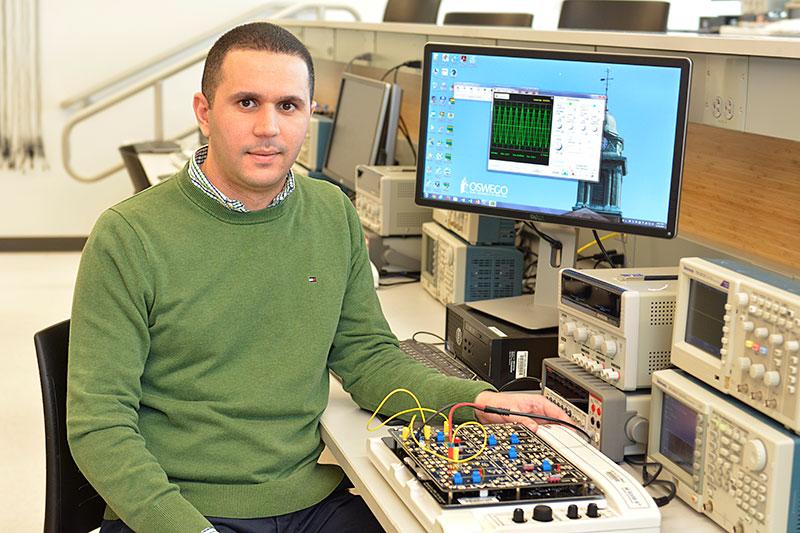Fast-developing field of 'smart' wireless fascinates ECE’s Bkassiny
In this issue’s Spotlight, meet electrical and computer engineering faculty member Mario Bkassiny (the “B” is pronounced),who involves his students in research that has promise for making wireless communications faster, more reliable.
Q. Where were you born and raised?
A. I was born in Lebanon and I grew up in a region to the north of Beirut, Wata Houb.
Q. Given the proximity to Middle Eastern strife, did you grow up peacefully?
A. I think the news sometimes gets a bit exaggerated. The area where we lived has been always a peaceful area. The troubles were in certain limited regions, especially near the country’s borders. Compared to the rest of the surrounding region, I would say Lebanon is relatively stable.
Q. Where did you study?
A. I finished my undergraduate and master’s degrees in Lebanon, and came to the U.S. for my Ph.D. at the University of New Mexico in Albuquerque.
Q. Can you describe your central area of research interest?
A. My main focus is on “cognitive radios.” What it means is smart communications, combining ideas from artificial intelligence and wireless communications. We try to research how to better invest the electromagnetic spectrum. For example, when there are lots of communicating devices, the radio spectrum gets crowded and wireless communications get less reliable. My research objective is to ensure reliable communications, even in such crowded environments. We also try to make better use of the spectrum in order to have faster communications. For example, if you want to send an image or a video as a message, we design techniques allowing fast data transmission. In brief, the ultimate objective is to have communications anywhere at any time. These research results were published in several peer-reviewed journals and at conferences.
Q. When did you come to Oswego?
A. I came here in 2013. At that time, I was trying to graduate from my Ph.D., and I was applying to jobs at several places. I applied here, I got interviewed and found the environment is a good work environment. The ECE department here was starting that year. We had some opportunities to try to develop it, and I thought I can have a good opportunity to contribute into the development of the program. The facilities here, the labs are very useful for projects. This was one of the main criteria to select this place.
Q. What subjects do you teach?
A. Every semester I teach different topics: signals and systems, communication systems, wireless communications, digital systems, electric circuits. In our program, we deal with all aspects of electrical systems. We try to integrate components and design systems from scratch—the students try to build it, connect it, test it to see if it does the job it’s required to do. Problem-solving is one of the main aspects we focus on. After graduation, (students) could work as systems engineers in industry; they can work on developing electrical systems, (such as) radio frequency devices; they could design electronic chips or communication devices or work in signal processing or signal analysis. They could, as well, go for graduate studies and into research.
Q. What do you think of SUNY Oswego students?
A. They are very motivated, they like working on projects, they like challenges. Sometimes you just give them a small idea, they develop it and make it more interesting from an engineering point of view. It is very important to have this spirit of creativity and innovation.
Q. What do you think of your colleagues?
A. The ECE department is a very cooperative and friendly environment to work in. I think it’s important to have such a collaborative environment to be able to share and discuss ideas with colleagues, which helps to improve the overall teaching method and to come up with new ideas for projects. We also have close relations with the computer science department since we share a few common courses.
Q. What are your near-term career goals?
A. I try to focus on research and teaching in parallel. I’m continuously trying to expand my previous research and develop it, and try as much as possible to have my students involved in this work. I’ve had several students working on summer projects—we had three different projects presented this year here on campus. A few weeks ago, two students presented their work at the Technology Fall Conference. I also try to develop new courses in our program. I’ve developed a course in wireless communications. Every year, we need to review and update the courses—these areas are developing very fast, so you have to keep up with what’s new in the field, which is exciting. It’s dynamic, it’s not static. It doesn’t ever get boring.
Q. What can you tell us about your family?
A. My father is retired from the Lebanese army. My mother doesn’t work outside the home. I have a younger brother and sister.
Q. What are your interests outside work?
A. I like exercising—walking or sometimes hiking—and listening to music. I’m limited in time, so this is not on a regular basis. I’m not very good at cooking. I miss the (Lebanese) food sometimes. There are a few places in the area that have Lebanese or Middle Eastern food, so I try to go there from time to time. We’re lucky to have restaurants from different cultures, so I like to try different types of food.




